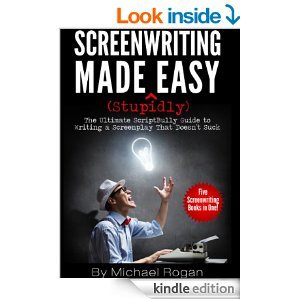Michael Rogan's Blog, page 6
August 12, 2015
The ScriptBully Book Collection
Screenwriting Made (Stupidly) Easy – The Ultimate ScriptBully Guide
Whether its sharpening your dialogue or creating more vivid characters to learning to format a telephone call, here is the complete ScriptBully collection that will take you from idea to marketing in the screenwriting process.
How to Write a Screenplay That Doesn’t Suck (and Will Actually Sell)
There are nearly 50,000 screenplays registered with the Writer’s Guild every year. And 99 percent of them suck. This is the ultimate guide to help you avoid suckiness – and write a script that can actually make you money.
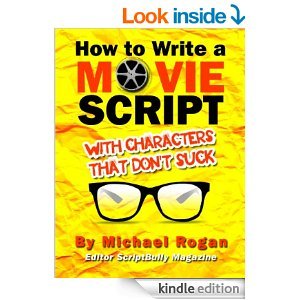 How to Write a Movie Script With Characters That Don’t Suck
How to Write a Movie Script With Characters That Don’t Suck
Forget three-act structure and detailed scene outlines. The success and marketability of your script will depend on the power of emotional depth of your characters. This book shows you a step-by-step strategy for creating characters that don’t suck – and get Hollywood interested.
How to Write With a Script With Dialogue That Doesn’t Suck
Most writers think dialogue can’t be taught. Bull-hockey! In this book I walk you through from dialogue newbie to verbal character battle expert. (And all without asking you to watch a single “Transformers” movie.)
 Screenplay Format Made (Stupidly) Easy
Screenplay Format Made (Stupidly) Easy
Want a screenplay template guide that will show how you to do cool things like a CROSS DISSOLVE or an INTERCUT or an ANGLE ON without looking like a total newbie? Want some clear screenplay examples that don’t sound like they came from the 80s? Get your Ph.D in Screenplay Format studies with this done-for-you manual.
Selling a Screenplay in the 21st Century
Ya know what’s even more fun than writing a screenplay…that’s right! Selling a screenplay! In this super-simple blueprint to getting your script sold, you’ll learn modern, new techniques for turning those hours of typing into an asset that can make you money – and jump-start your writing career.
The post The ScriptBully Book Collection appeared first on ScriptBully.
Grab a Seat to Our 100% TOTALLY FREE Screenwriting Seminar
Need a STORY idea for your next screenplay? Get access to our NEW (Totally-Free) Screenwriting Seminar: “5 Secrets to a Movie Idea That Doesn’t Suck (and Will Actually Sell)!”
The post Grab a Seat to Our 100% TOTALLY FREE Screenwriting Seminar appeared first on ScriptBully.
July 30, 2015
7 Script Formatting Issues Debunked (and Demystified)

Script formatting isn’t the sexiest part of screenwriting. But having worked as a screenplay reader I can tell you it IS important. (Especially for some of the thornier script format conundrums.) So here’s a slide deck of 7 of the more common script format issues…and how to deal with ’em like a pro.
7 Script Formatting Issues (Totally) Debunked from scriptbully
The post 7 Script Formatting Issues Debunked
(and Demystified) appeared first on ScriptBully.
July 17, 2015
7 Script Ideas That Changed (Dramatically) on the Way to the Screen
Quality script ideas are the foundation of any good movie. (And creating them is one of the FIRST big steps to becoming a screenwriter that doesn’t suck.) But learning how malleable – and constantly evolving – screenplay ideas can be is a valuable lesson every screenwriter should learn.
So, here are 7 blockbuster movies whose final product differed greatly from their initial script ideas.
7 Script ideas That Changed (Dramatically) on the Way to the Screen from scriptbully
The post 7 Script Ideas That Changed (Dramatically) on the Way to the Screen appeared first on ScriptBully.
May 31, 2015
How to Sell a Screenplay (Even If You Live in Pocatello, Idaho)

The biggest question I get from screenwriters isn’t about how to craft compelling characters or come up with a second act that doesn’t put readers into a coma…it’s how to sell a screenplay. (Especially if you’re not paying $1800 a month for a 1/2 bedroom on Hollywood Blvd.)
And while it can be lethal to the creative process to worry TOO MUCH about the marketability of your screenplay. At some point, you’ll want to know how DO i sell this screenplay I’ve been working on for eight years? (And can it make me any money?)
So here are my THREE KEYS to knowing how to sell a screenplay (even if 3000 miles away from Hollywood.)
How to Sell a Screenplay Key #1: Keep Your Eyes on the Prize
So, I hate to bring up math. (I’m a writer too, so I abhor the subject.) But sometimes we’ve got to cut through the liberal-arts horseshit and get to the point.
Not all screenplay sales are created equal.
The ones we hear about are the 250-400K sales that make the back pages of the Hollywood Reporter. (And these are fantastic.)
But we never hear about the below-scale deals made with foreign producers or off-the-grid production companies or those most strange nether regions of the Internet such as Craigslist.
Because if your story idea “seems” marketable – even if the script sucks – then somebody else will probably give you SOME money for it. (That money can be as little as $500, or even a $1 in some cases.)
And that doesn’t mean those people are unscrupulous. Just that they’re broke.
What’s most important, to you as a screenwriter, is that you’re able to turn your script into a project. An asset that could then be turned into something that gets made.
And that’s the REAL prize. Because if you write a project that actually gets made suddenly you are seen as a real player in this bizness. (And those $750K paydays get a lot easier.)
So look for reputable people who actally have their shit together. (And can turn your script into something OTHER PEOPLE will actually pay money to see.)
How to Sell a Screenplay Key #2: Don’t Stress It If you Live Out of Town
As somebody who lived in L.A., I can tell you there is an undeniable advantage to being a resident of the Southland.
But it’s not because of some magical force field that surrounds the 310 and 213 area codes. (That’s just smog.) It’s just that SO MANY damn people are connected to the film business. (Them tentacles run pretty deep.)
But…not only is it not impossible to get your script read, and eventually sold, if you live ANYWHERE ELSE. Many development folks actually get bored with most of the super-hip crap that comes out of Southern California.
And all they really want is a simple, yet profound story that moves people. (Not something that impresses everybody at the Larry Edmund’s bookstore.)
So…if you do live in town, you can always bridge the gap by:
Taking an online screenwriting course (UCLA is great for this)
Planning a trip to L.A. where you can take in a WGA event or any AFI panels
Go to as many film festivals as you can
Hit up screenwriters, directors and actors you like on Facebook and Twitter. (Just don’t be creepy.)
And just remember as insecure you feel, just try living in a town where every waitress is a supermodel-in-waiting and every lifeguard is a leading-man candidate.
How to Sell a Screenplay Key #3: Don’t Waste Your Time On Agents
Unless you become a Nicholl Fellowship finalist – or get J.J. Abrams to read your script at Whole Foods – it’s SUPER unlikely you’ll ever get an agent to show ANY interest in your script.
I know you don’t believe me. I know you’re gonna want to prove me wrong. (And I really hope you do.) But all that energy and time and psychic distress spent on waiting for some Santa Monica agency to return your calls could be spent on…
Producers and Agents of Actors and Directors!
That’s right. Instead of looking for writer agents, instead focus on the agents of OTHER TALENT who can be helped by your script. (Horror film actresses and film-school directors are perfect for this.)
Pore through as many recent films and TV shows as you can looking for talent you think would click with your script. And when you’ve got a list it’s time to…
How to Sell a Screenplay Key #4: Screw the Post Office
No offense to my comrades in USPS blue, but query letters are just way too much trouble these days for most film folks. Instead you’l want to write ’em an email (you can get the contact info from imdB Pro) and let ’em know you’ve got the perfect script for their client.
Don’t tell ’em about your education. Or your life ambition. Or your looming bankruptcy.
Just say:
I’ve got a romantic action comedy which I think would be perfect for your client. It’s called Till Death Do We Fight and it’s about a divorced couple who must fight to the death in a dystopian futurisitc gameshow setting – if they can learn to not kill each other first. (It’s Hunger Games Meets The War of the Roses…without the archery.)
That’s it!
Be funny. Be short. Be cool. (And not clingy.)
And you’ll find, sooner than later, that selling a screenplay is far easier than you, or your friends in Idaho, ever thought.
The post How to Sell a Screenplay (Even If You Live in Pocatello, Idaho) appeared first on ScriptBully.
Script Coverage FAQ

Script coverage is the “designated hitter” of the screenwriting craft – everyone has a strong opinion about it. (And nobody can seem to agree.)
Some think it’s a worthwhile and effective system of screenplay analysis to determine the marketability of a script. Others think it’s a needless obstacle to keep novice scripts out of the Hollywood pipeline?
And what the HELL is script coverage anyway? (And what are the different kinds of screenplay coverage anyway?)
So here is a handy-dandy Script Coverage FAQ to help you navigate the murky – if necessary – waters of screenplay coverage:
Script Coverage FAQ #1: What the HECK is Script Coverage?
Script coverage is a film-industry term to describe the analysis and subsequent evaluation of a screenplay. It is usually executed by the development department of a production company, either independent or attached to studio.
But most agencies, managers – even directors and actors – have somebody on their team who does script coverage.
Script Coverage FAQ #2: Why the Need for Script Coverage?
Because most scripts suck.
Sorry…were you looking for something a bit more polite?
Okay, how about most film-industry folks are exceptionally busy and the best use of their limited resources are not in reading each and every script that comes in.
But, really, it’s about “saving” industry types from reading crappy screenplays.
Script Coverage FAQ #3: Are There Different Kinds of Script Coverage?
There are essentially TWO kinds of screenplay coverage:
1) Traditional script coverage which the film industry uses to vett, filter and grade the mountain of scripts that land on their desk. (Separating the wheat from the badly-formatted chaff.)
And 2) script coverage used in an educational setting. (Where a dedicated screenplay expert/guru provides the writer – for a fee – “professional coverage and notes” that the writer can then use to improve their script and boost its marketability.
The first requires no payment. (Though some unscrupulous characters will try to convince you otherwise.) The second can range anywhere from a couple hundred dollars to $5,000 or more.
Script Coverage FAQ #4: Ouch! Is 5K Screenplay Coverage Worth It?
Depends. Probably not.
If the script ends up selling, or gets you a writing gig, then it’s worth it. (And if it skims 1-2 years off your screenwriting learning curve…then it’s totally worth it.)
Trouble is: we are the worst judge to determine whether our writing is CLOSE to the finish line. (Or miles away.)
In my experience, a couple hundred bucks is a good amount to spend on coverage that could help you take the next step in your screenwriting career. (Without putting you in bankruptcy.)
Script Coverage FAQ #5: What’s in a Typical Piece of Screenplay Coverage?
Usually, it’s broken up into SEVEN key parts: (Though the order can differ depending on who is doing the script coverage.)
Author Info (this includes who wrote the piece, contact info, genre, etc.)
Logline (1-sentence summary of the script)
Summary (this is a 1-2 paragraph summary of the overall analysis of the script)
Grade or Matrix (usually in the form of Consider, Maybe or Pass – or sometimes seen as Excellent, Fair and Poor)
Synopsis (2-4 page breakdown of the major events of the script)
Budget/Marketability (this is optional, but can often be the most important part of the coverage)
Analysis (the meat of the script coverage, where the screenplay’s merits – and failings – are brought to light)
Script Coverage FAQ #6: What’s the Most Important Part of Coverage?
Well, it’s ALL important. But in my experience, I found my BOSSES usually wanted to see the “grade” and “summary” first. (To see if reading the rest is worth their time.) Then they’d dig into the “Analysis” and “Budget.”
But even a “Maybe” or “Fair” isn’t career-destroying. Perhaps the material wasn’t a good fit for them, but they like your talent as a writer. (This is true even for producers.)
What can’t be helped is a “poor” or “pass.” This means you are dead to them, and should probably burn their business card.
As for the more consultative coverage, I think it’s ALL key. But funnily enough the synopsis is one part that I think is most instructive. Reading what somebody else THINKS your story is about is often more instructive then particular value judgements about your talent as a screenwriter.
Script Coverage FAQ #7: How Do I Get to See My Script Coverage?
Well that’ll depend on where you send it. Most big agencies and studios keep theirs under lock-and-key. (Trade secrets and all.) But a small boutique agency or producer might send it, if you ask.
Don’t depend on it: this is a tool for THEM not for you.
What you CAN do is ask for the synopsis. Tell them it’ll help your craft as a writer to see HOW an external reader sees the big events of your script. Sometimes they’ll send that along. (And that can be exceptionally helpful.)
Script Coverage FAQ #8: Who Typically Handles Script Coverage?
Ah, yes, this would be the grunts of the film biz – screenplay readers. An underpaid, overlooked – but important – part of the business.
Generally these are would-be screenwriters, agents, or producers who welcome the absymal pay for the chance to work in a production company, agency and studio. (Sounds glamorous. Trust me, I did it for years. It’s not.)
Script Coverage FAQ #9: If It’s Handled By Pawns of the Biz, Why Is It So Important?
It’s like the open auditions of American Idol. You’re not trying to win the WHOLE competition…you just want to hear the words: “You’re going to Hollywood.” And in this scenario, getting good coverage and having your script moved up the food chain IS going to Hollywood.
Script Coverage FAQ #10: Yeah, But Why Should I Expect to Get a Fair Read of My Script
Because most screenplay readers don’t want to be one for life. They have bigger film biz fish to fry. And sharing a quality project with your bosses – that eventually gets stars attracted and financing involved – is the quickest way out of endentured servitude.
Script Coverage FAQ #11: Is There Anything I Can Do to Improve the Coverage of My Script?
Ya mean, besides write a damn good script?
When you’re preparing imagine one of your cool friends – you know the one who loves movies like you do – is reading your script. Enterain them. Be funny. Keep the paragraphs short. Get to the point. Make it an enjoyable read.
These things may not guarantee a 200K spec script sale. But they will guarantee you the best shot at possible at a kick-ass screenwriting career.
The post Script Coverage FAQ appeared first on ScriptBully.
May 29, 2015
Movie Making Crash Course for Filmmaking Newbies

Think because you’ve watched the “Director’s Commentary” on every Tarantino film that you’re an expert on movie making? Not sure how a script gets turned into an actual movie? (And in which order all that technical crap gets done.)
Well here is a movie making crash course for screenwriters, producer and directors wanting to know more about the business.
Note: Obviously some elements of movie making will be expanded or eliminated based on the budget and scope of a specific project. But this is a good, general framework to help you get educated. (And to help you NOT sound like a newbie.)
Movie Making Pillar #1: Development (Hell)
Everything starts with a script. (Or an idea for a script.) And that EVERYTHING includes endless meetings (and tons of notes) with key stakeholders. And these stakeholders include:
The screenwriter (duh)
A producer (or team of producers)
A director
A studio or some form of financing
A BIG STAR (who might also be attached as a producer)
Development hell can last anywhere from a few months to the end of time. (The more outside money you need, the more input/development there will be.)
There will usually be rewrites, and more notes, and more rewrites. (At this time casting choices are bandied about to help with financing.)
But the key thing to remember, if you’re a screenwriter, is that development folks:
Usually have a pretty grasp of what works in a story (and in the marketplace)
Want the project to succeed artistically and financially (Obviously an emphasis on latter)
Development is a dance. And whatever your particular role in development, the more you can see it as a chaotic weird dance – the more fun you’ll have. (And possibly achieve your creative vision, while still making money for investors.)
Movie Making Pillar #2: Pre-Production
So…when does pre-production start? Well, when somebody actually writes a check. Until then, your project is just this nebulous thing that you can talk about your local Coffee Bean and Tea Leaf.
Once you’ve got a budget – and the funds to back it up – then it’s time for the project to assemble:
A casting director (who has to look through thousands of head shots to find Cop #2)
A location scout (to find that post-apocalyptic zombie cafe for your third act)
A line producer (this is the real producer – the guy or girl who goes line-by-line through the script and makes a list of all the crap that has to be bought)
Cinematographer (the person who does a visual script breakdown with the director – and of course claims they can’t do the project in anything less than 70mm)
1st AD (this is the person who makes the production schedule – and generally tells the director everything is wrong and nothing is working)
Production Designer (Probably the coolest, hippest person on the project; helps come up with a look and feel of the project)
Once all the materials, assets and schedules for shooting are completed it’s time for…
Movie Making Pillar #3: Production
Okay, so you’ve got your actors, your locations – your rented llamas – it’s now time to start shooting.
So here is how a typical shooting day works.
Principal Photography (this is the “set up the equipment while the 1st AD bosses everybody around) part of the day. (Actors are usually in makeup and the director is usually having coffee with some Russian supermodel.)
Blocking (this is when the director actually “directs” the actors in terms of movement and performance)
Shot Prep (this is when the cinematographer takes over, decinding on things like focal length and lighting to get the shot the director wants)
Shooting (all that prep leads to actual film/hard drive space being captured)
Monitor Review (if the project has a monitor this is when the director, cinematographer – and that BIG EGO ACTOR – will stare at the monitor and make sure that heartfelt scene with the puppy and the nun actually worked.)
Rinse and repeat for the next 2-3 weeks – or if you’re Rinchard Linklater 5-7 years – and you’ll be ready for…
Movie Making Pillar #4: Post-Production
I know it sounds like a cliche, but this IS where the magic happens. Where all those random moments and set ups and medium shots and obnoxious close-ups are cobbled together into a finely-tuned machine.
This includes things like:
Editing (a constant process that has many forms – and many expectant masters)
Mixing (where sound effects are added and dialogue is re-recorded)
Music Scoring (probably the most fun, creative part of a film – and the thing that really transforms material into an actual movie)
Test Screenings (These can be as simple as a screening for your parents to as complex as a focus group in Santa Barbara)
And after six months, or if you’re Oliver Stone two years, it’s time to finally send your movie to…
Movie Making Pillar #5: Distribution
If you’re an indie filmmaker this will usually be in the film festival circuit. (Or perhaps make the rounds at your school.)
But wherever you are on the movie making continuum, and whatever your role, make sure your project takes the time to get things right in the post-production phase. (No point in rushing a projec that isn’t ready for prime time.)
And be careful of them sleazebag film distributors. They will make you all kinds of promises. (And guarantee results: for a small fee, of course.)
The best course is to tell a really good story. (And remove all that self-indulgent film-school crap. ) And if you do that, you won’t just build an organic following. (You’ll build a career as well.)
The post Movie Making Crash Course for Filmmaking Newbies appeared first on ScriptBully.
May 26, 2015
Top 5 (Totally-Free) Places to Find Screenplays Online

I’m SO old I remember a time when you couldn’t find screenplays online. Mostly because there was NO online. (Some of you scripty younguns won’t believe me. But there was a time before Google. I think it’s called the “Mesozoic era.”)
But THESE DAYS there’s no excuse for boosting your screenwriting craft – and nothing sharpens your screenwriter skills like reading tons of good (and bad) scripts.
So here are 5 Kick-Ass Locations to find screenplays online…without paying a single dime.
(Warning: Like a studio head’s job, these sites can (and may) disappear. If you like a script, grab it…FAST!)
#1 Place to Find Free Screenplays Online: Simply Scripts
There’s so many things I like about Simply Scripts. The prominent front page, which displays the latest scripts. The fact that they mix in unproduced – but industry-worthy – scripts from time to time. The great collection of not only movie scripts, plays, and even non-english scripts.
And…in my never humble opinion…they seem to have the MOST stable platform of all the scripts online services. (No wonky server issues.)
Now there are a few pesky Google ads to deal with. But so what…welcome to the Internet. Otherwise a fantastic and worthwhile resource.
Link: Simply Scripts
#2 Place to Find Free Screenplays Online: Daily Script
Daily Script is like a bare-bones Craigslist-type alternative to the “somewhat” flashy Simply Scripts.
Super easy to navigate. (No frills, remember.) And a pretty decent collection. (Though they won’t have as much new stuff as Simply Scripts.) Daily Script is a must bookmark in your browser. (In addition they’ve got an IMDB link for each movie in each listing. Pretty frickin’ cool.)
Link: Daily Script
#3 Place to Find Screenplays Online: John August Blog
So, John August, screenwriter of “Go,” “Big Fish,” “Charlie’s Angels,” – and a noteworthy director in his own right – has gone the extra screenwriting mile by sharing all of of his scripts (and their many drafts) on his blog.
Obviously you won’t get the selection of the other online screenplay sites, but if you want to deep-dive in how a script can change from original spec to shooting script (to even audition scene for casting) then this rare and valuable library is a worthwhile add to your screenwriting to-do list.
Link: John August Blog
#4 Place to Find Free Screenplays Online: Internet Movie Script Database
So…this site isn’t so much a script collection, as it is a search engine to finding scripts online.
Now some of the user experience features are a bit odd. (Really…I have to copy and past the script of newer releases.) But if you’re terminally lazy – like me – and don’t want to traipse all over the Internet looking for a script this is a good express lane to zoom past.
Link: Internet Movie Script Database
#5 Place to Find Free Screenplays Online: Drew’s Script O Rama
I almost didn’t put Drew’s site on the list. (For one, the home squeeze page is a bit spammy – asking you to download some adware onto your computer.)
But this WAS the online script resource back in the day. Now you’ll want to avoid the Google ads – and the transcribe scripts are pretty worthless.
But if you’re looking for a specific script – they’ve got some nice anime collections – then you’ll want to give Drew’s Script O Rama a try.
Link: Drew’s Script-a-Rama
Did I miss resource to find screenplays online? Think my choices are crap? Let me know in the comments below!
The post Top 5 (Totally-Free) Places to Find Screenplays Online appeared first on ScriptBully.
May 22, 2015
7 Screenwriting Competitions That Don’t Suck (and Might Actually Make You Money)

Screenwriting competitions are definitely NOT created equal. (No offense to the Eastern Pocatello Auxiliary Kiwanis Screenwriting competition.)
Some can gain you access to film-industry insiders and skyrocket your screenwriting career into the next stratosphere. Others offer little more than an opportnity to “donate” $75 to the coffers of the screenwriting contest.
But which screenwriting competitions should you enter? Which screenwriting contests can ACTUALLY do something for your screenwriting career?
Here is a fast look at 10 Screenwriting competitions you’d be an idiot NOT to enter: (Scores based out of 10.0)
Screenwriting Competitions That Don’t Suck #1: Don and Gee Nicholl Fellowship
This is the BIG KAHUNA. The grand enchilada. The pre-eminent screenwriting competition in the world sponsored by the Academy of Motion Picture Arts and Sciences. (Mostly because it’s not JUST a simple contest, but it’s a fellowship where winners are awarded a one-year stipend to work on a script.) And though it’s extremely competitive, simply being a semi-finalist for this competition have your phone ringing off the hook from producers and agents. (Which is why it’s helpful to have a few scripts in your drawer when entering.)
Deadline: May
Info: http://www.oscars.org/awards/nicholl/
Screenwriting Competitions That Don’t Suck #2: Warner Bros. TV Writer’s Workshop
Like the name implies, this one ain’t just a competition – it’s a fully-integrated workshop designed specifically for TV writers. And though you MAY not think your writing skills are wired for the small-screen, if you’ve got a romantic comedy or police procedural sample rolling around in your desk drawer, then this year-long workshop might just be the perfect vehicle for your dialogue-heavy screenwriting craft. (Great for playwrights too!)
Deadline: May
Info: http://writersworkshop.warnerbros.com/
Screenwriting Competitions That Don’t Suck #3: Austin Heart of Film Screenplay Competition
This competition does double-duty as a film festival – and networking event – that provides would-be pro screenwriters the chance to meet industry types in a relaxed, non-Hollywood setting. Not only does the list of past winners contain a bunch of screenwriters who’ve used the competition as a springboard for jumping into the movie business, but it’s one of the few script competitions where you actually get the chance to meet the organizers. (And possibly get to give an acceptance speech after your third gin and tonic.)
Dedline: April
More Info: http://www.austinfilmfestival.com/submit/screenplayandteleplay/40
Screenwriting Competitions That Don’t Suck #4: Page International Screenwriting Awards
The prizes are impressive. (25K is the grand prize!) But it’s the success its winners have gone on to have in the screenwriting biz. Best of all, it’s an international contest. (So no worries if your story doesn’t contain robots that turn into Ford Trucks.)
Deadline: February
More Info: http://pageawards.com/
Screenwriting Competitions That Don’t Suck #5: Script-a-Palooza
Going strong for sixteen years now, the BIG draw of this screenwriting contest is the collection of judges: producers, literary agents, and managers. This competition tends to attract lots of young, emerging Hollywood development talent. (A perfect way to create your own entree into the film biz.) And besides. how cool is a name like “Script-a-Palooza?”
Deadline: April
More Info: http://www.scriptapalooza.com/home.php
Screenwriting Competitions That Don’t Suck #6: Slamdance Screenplay Competition
Forget Sundance. This showcase for raw and innovative filmmaking might just be the best script competition in Utah. Offering a great venue to get feedback from actual fillmakers – not just agency interns – this well-respected contest is a must-add to your submission list. (Well respected in the industry as well.)
Deadline: June
Info: http://www.slamdance.com/
Screenwriting Competitions That Don’t Suck #7: Sundance Screenwriter’s Lab
Okay, so maybe you shouldn’t forget Sundance entirely. This five-day intensive workshop is super-competitive – as you’d expect – and does (usually) prefer scripts with a “message.” But this respected script competition gives independent screenwriters time to work on their scripts with the assistance of development pros. (Not to mention provide some amazing scenery to look at while you procrastinate.)
Deadline: January and June
Info: http://www.sundance.org/programs/screenwriters-lab/
The post 7 Screenwriting Competitions That Don’t Suck (and Might Actually Make You Money) appeared first on ScriptBully.
101 Screenwriting Tips That Don’t Suck
Welcome to 101 Screenwriting Tips That Don’t Suck! This is – what the hip, tech-crowd calls – a “living document.” (Meaning we’ll continue to update it with tips as we come across them. And I’m TOO LAZY to come up with ALL 101 Screenwriting Tips at once.)
If you’ve got a suggestion for one of the 101 Screenwriting Tips be sure to let us know over at our Facebook page. And if you’d like to FOLLOW our Pinterest board of the same name you can find it over here.
Let the Screenwriting Tips of Non-Sucky Awesomeness Begin!
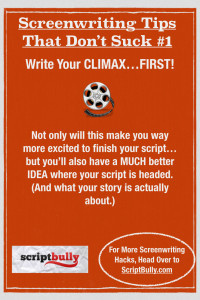 Screenwriting Tips That Don’t Suck #1: Write Your Climax…FIRST!
Screenwriting Tips That Don’t Suck #1: Write Your Climax…FIRST!
Not only will this make you way more excited to finish your script…but you’ll also have a much better idea where your script is headed. (And what your story is actually about.)
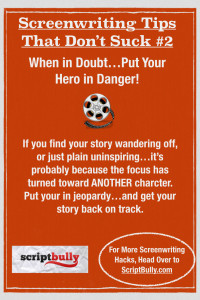 Screenwriting Tips That Don’t Suck #2: When in Doubt…Put Your Hero in Danger!
Screenwriting Tips That Don’t Suck #2: When in Doubt…Put Your Hero in Danger!
If you find your story wandering off, or just plain uninspiring…it’s probably because the focus has turned toward ANOTHER character. Put yours in jeopardy…and get your story back on track.
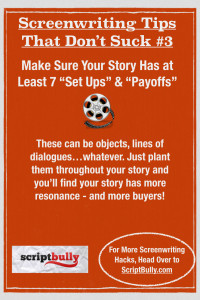 Screenwriting Tips That Don’t Suck #3: Make Sure Your Story Has at Least 7 “Set Ups” & “Payoffs”
Screenwriting Tips That Don’t Suck #3: Make Sure Your Story Has at Least 7 “Set Ups” & “Payoffs”
These can be objects, lines of dialogue…whatever. Just planet them througout your story and you’ll find your tale has more resonance – and more buyers!
 Screenwriting Tips That Don’t Suck #4: Don’t Be a Slave to 3-Act Structure
Screenwriting Tips That Don’t Suck #4: Don’t Be a Slave to 3-Act Structure
“Raiders of the Lost Ark” is seven acts. Shakespeare wrote in five. Don’t get hung up in ACTS. Think about sequences building to a climax. (And then string those out across your story which BUILDS to the BIGGEST climax of them all.)
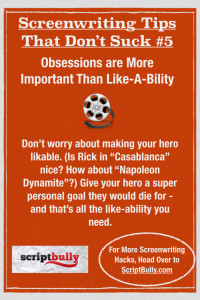 Screenwriting Tips That Don’t Suck #5: Obsessions are More Important Than Like-a-Bility
Screenwriting Tips That Don’t Suck #5: Obsessions are More Important Than Like-a-Bility
Don’t worry about making your hero like-able. (Is Rick in “Casablanca” nice? How about “Napoleon Dynamite?”) Give your hero a super personal goal they would die for – and that’s all the like-ability they need.
The post 101 Screenwriting Tips That Don’t Suck appeared first on ScriptBully.

